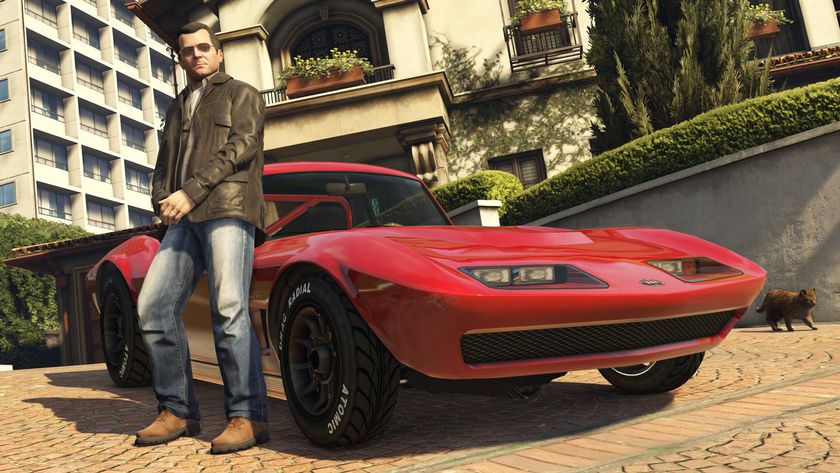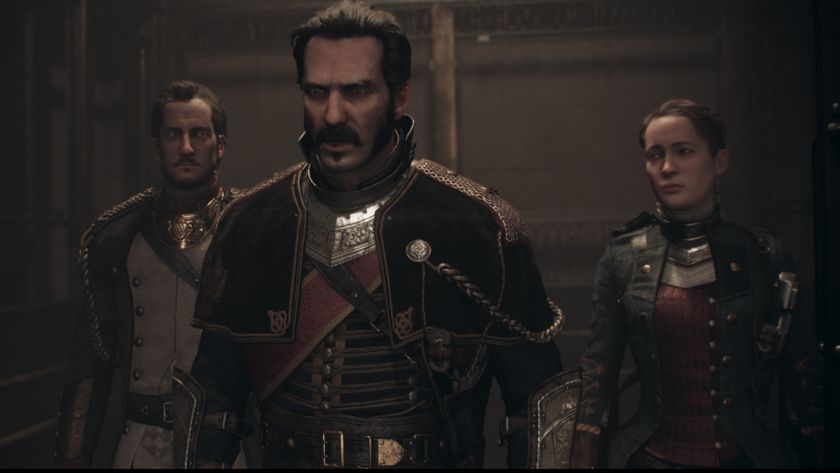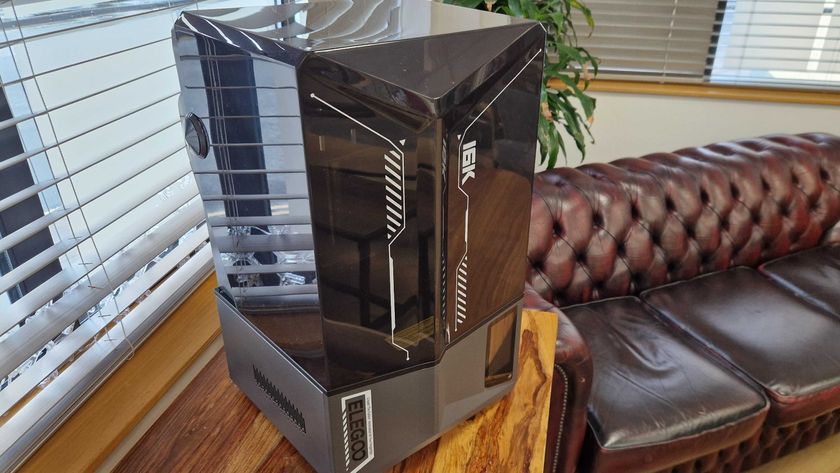The surprisingly complex and creative life of the video game tie-in novelist
It's fashionable to poke fun at the big guy. This is especially true when it comes to prolific entertainment franchises, the kind which spawn yearly sequels, a trailer a week for six months of each of those years, and action figures lined up all the way to the horizon. But things are more complicated than you might think. Because even if such wariness can be justified, when you look beyond the gestalt brand-beast and begin to pore more carefully over its constituent parts, you’ll often find that such mistrust is a broad brush to paint with. On a granular level, things frequently just aren’t that black and white.
Tie-in novels in particular suffer from growing franchise cynicism, leading to something of an image problem they don't always deserve. Presumed to be b-side lunges at tertiary publicity, it's tempting to dismiss them out of hand, but to do so is to misguidedly tar them with the same brush as the million cheap movie novelisations that came before them. Celebrating gaming's capacity for storytelling is currently in vogue, and for very good reason. Consequently, books set in these worlds are contradictory blends of potential and stigma. Such projects carry potential that their inspirations simply can't, making them ideal for expanding those universes in meaningful ways. If people will just give them the chance to.
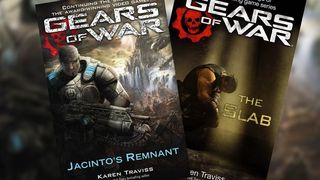
Speaking with veteran author Karen Traviss is enough to offer a taste of what so many of us overlook. As a New York Times bestseller whose credits include work that delves into Halo, Star Wars and Gears of War, she's more aware of the taboo than most. When we discussed the matter via e-mail, she was at pains to point out how novels aren't really about advertising the game that inspired them. If anything, it works the other way around.
Traditional advertising is about targeting a huge number of eyeballs in the hope of getting a percentage of the attached bodies to buy things. The games than inspire tie-in novels sell hugely more units than their literary spin-offs. "The game pushes the tie-in material', she says. Aside from that important truth, she tells me that the initial reasoning behind the commissioning of tie-ins varies immensely from franchise to franchise. Some want to expand brand awareness. Some want to make their universe more immersive and enriching. Some do it "just because it's become an expectation".
You'll often find the most effective projects to be the ones that fill the gaps around a franchise’s in-game content, and that's thanks to certain limitations of the source medium. Because games rely on interaction, progression, combat and frequently repetitive (if fun) tasks, there isn't always room for the trappings of traditional narrative around the ‘main’ story. Tie-in books, set elsewhere, have a chance to embrace the intricacies of culture, character development and daily life which don't fit into gaming's schedule.

"Authors who've never worked with franchises seem to think it's too restrictive to allow writers to exercise their originality, which is ironic given the enormous number of cookie-cutter 'original' novels out there", Karen says. "I don't think they realise how much leeway you have. Okay, maybe some writers don't get free rein, but the one thing I can't complain about is how much latitude I had in my franchise work. I wrote pretty well anything I wanted to and created whole new sub-brands".
Although writers are occasionally provided with a story 'bible' when starting projects (these detail the rules and lore of the worlds they'll be exploring), there isn't so much red-tape as you'd expect. In Traviss' experience, it wasn't common to be handed a list of characters or devices which absolutely must feature. Instead, she was left to decide a course herself.
Sign up to the SFX Newsletter
Get sneak previews, exclusive competitions and details of special events each month!
Accompanying novels aren't without limitations, nonetheless. There's a sense of weary cynicism hanging over Karen when discussing the subject, and - despite having had many pleasant experiences over the last few years - this was what led to her leaving the field for creator-owned work. The fact is, while author agency is much greater than outsiders might expect, such freedom is rather deceptive in a longer-term sense. Despite a fair amount of creative control on a book-by-book basis, ultimately you're a gun for hire with little to no say over the future of your creations, however successful they may be. For all the creative freedom she has enjoyed, Traviss is all to aware that it has to stop somewhere.
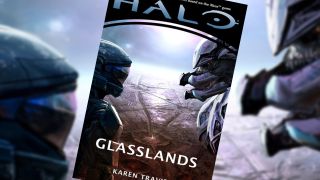
"But – and this is a big caveat – it's not your property. If the franchise doesn't want something, you can't do it. They scrutinise every word before they sign off a book, and even if they leave the books unchanged, as they did with me, there's always a point when franchises decide to go in a different direction. Many readers don't understand that a writer can't then go it alone and carry on writing books without the franchise's approval. It's the law. It's their copyright and you'll be knee-deep in lawyers if you take their property and do your own thing with it. It's not fan fiction. It's breach of copyright.”
This is an important distinction to make. Whereas creator-owned work can be dictated by the author's vision, dabbling with someone else's property keeps it under their thumb. As an outside contractor, the writer isn't given final say; it's the creative equivalent of a nine-to-five job, and everything they hand over then becomes the franchise's property. As with many types of media, this is something the audience needs to bear in mind when tossing around blame. We'll sometimes lampoon people for a decision which wasn't theirs.
If a writer's responsibility is nebulous, the issue of payment is even more so. Traviss makes it clear that, while some employers settle up promptly and without fuss, there are those who never paid what they owed. That's on top of complications concerning royalties.
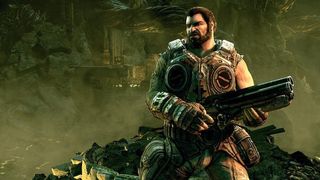
"In other media, such as comics, if you create a successful character or whatever for a franchise, you often get paid extra if it's used in a movie or for an action figure, or lifted for use in a game," she said. "But novelists don't get that. I'll be honest and say I eventually got fed up with creating successful characters that added value to franchises but earned me nothing".
This is partially why Traviss pursues her own projects now, along with the odd franchise comic. Such a decision offers freedom where before there were limits. It's an opportunity Karen's made the most of, resulting in the techno-thriller Going Grey and its upcoming sequel, Black Run. Having settled on direct publishing after pulling both from a traditional deal, she explains that she "couldn't afford to lose control of a book again".
Because that's the reality; the business surrounding the craft of writing books is unforgiving, and tie-in novels aren't any different. Attempting to work around a game's development (which is highly subject to change) can provide major headaches. That's ignoring branching narratives or alternate endings, too.
"I've tried to persuade game studios to consider sidebar stories and not shackle novels too tightly to their game," Karen notes. "Games really are subject to a lot of churn, and IPs – not just games, all of them – are notoriously bad at keeping external writers in the loop. I've had to re-jig novels because nobody told me they'd used a character and written dialogue that changed the characterisation. A novel relies heavily on small detail, especially with character motivation, and that detail extends far further into the fabric of the story than it would in a game. A book is a bigger, slower ship to turn around".

Regular communication is therefore critical, to the point where being without it might scupper a project. Traviss mentions how she liked to turn in chapters often, not to mention discussing any changes she made for fear of hitting twists. As she points out, "You don't want to get to the end of a very long book only to find they omitted to tell you that an element the book was built on had been axed. Which happens... Smart IPs fill in as little story detail as possible but have a very clear vision of the world the game is set in. Franchises that spend ages planning their universe in microscopic detail for the next thousand years often get bitten in the arse because stories don't evolve that way and they just paint themselves into corners that require unconvincing retcons. Play safe and don't fill in anything you don't have to. I'd advise writers to do that as well".
This can cast a shadow over gaming's tie-in novels, and that's unfortunate; they have a significant amount to offer in terms of world-building and immersion. In Traviss' eyes, the answer hinges on how they're distributed. Namely, there's no reason why franchises must go through the more logistically restrictive process of conventional publishing anymore. Posting them online as ebooks may be the way forward, she suggests.
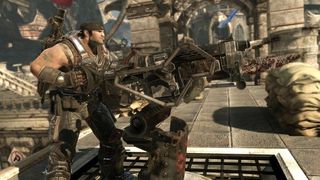
"If you've already got a big, loyal, predominantly online audience and a ready-made market, as games have, why not just go one step further and drop the middle-man?" Karen asks. "I don't know how much the bigger games get for their publishing licences these days, but I'd bet that it's not the biggest revenue item for most games. It has to be worth crunching the numbers and experimenting. If any studio did that, it might tempt me back one day".
This is certainly worth exploring, because tie-in novels have one final (and unexpected) virtue.
"One IP was very open and said that having a novel series for their game made them feel like they'd arrived and were a 'proper' franchise", Karen concludes. "One guy told me he'd proudly showed the first novel to his family to demonstrate that the game that had kept him working almost 24/7 for the last couple of years was something that had an existence beyond gameplay, and that a novelist, an 'independent' arbiter of its worth in a way, had seen the same magic in it that he had. I thought that was very touching, and I don't use the word touching about the industry very often".

I've been writing about games in one form or another since 2012, and now manage GamesRadar+'s tabletop gaming and toy coverage. You'll find my grubby paws on everything from board game reviews to the latest Lego news.
Most Popular






